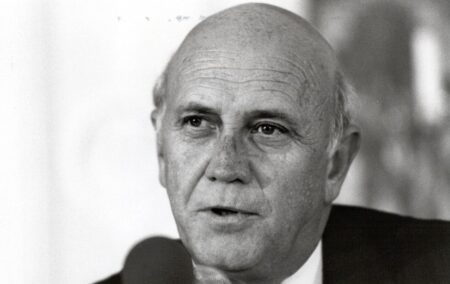Tributes, criticism and some notably tasteless reactions greeted the news yesterday of the death from cancer of the last president of the apartheid era, F W de Klerk.
Widely credited with triggering the end of apartheid by unbanning the African National Congress (ANC) and other restricted organisations in 1990 and launching all-race negotiations, De Klerk went on to serve under the first democratically elected president, Nelson Mandela, in the post-1994 Government of National Unity.
Critics on opposite sides of the political spectrum accused him, variously, of caving in to ANC demands, and failing to fully atone for apartheid atrocities.
Most historians agree that his announcements of 2 February 1990 and his commitment to a negotiated political settlement over the next few years were pivotal to the relatively stable transition to democracy in 1994.
His role in various senior capacities in successive National Party (NP) governments has long drawn critics’ attention, and appears to be central to comments yesterday from the likes of EFF leader Julius Malema – who tweeted ‘Thank you God’ at the news of his death – and Dudu Zuma-Sambudla, who tweeted: ‘It’s A Wonderful Day To Be Alive Today.’
Frederik Willem de Klerk, the son of an NP senator and minister, trained as a lawyer, entering Parliament in 1972. He gained his first Cabinet appointment under Prime Minister John Vorster, and thereafter occupied various portfolios, including Minister of National Education.
In early 1989, De Klerk emerged the winner in a round of caucus voting as leader of the NP, following incumbent President P W Botha’s resignation as party leader. In the months that followed, Botha came under increasing pressure from within the party to resign as head of state. De Klerk succeeded him, and, in the new year, set the party and the country on a markedly altered course by declaring the government willing to negotiate an end to apartheid.
De Klerk played a key role in the political settlement that emerged from the four years of talks, and was appointed as a second deputy president, with Thabo Mbeki, under Nelson Mandela in the country’s first democratic administration.
The 1993 Nobel Peace Prize was jointly awarded to De Klerk and Mandela.
De Klerk latterly led his party out of the Government of National Unity in June 1996, and retired from politics a little over a year later, in August 1997.
Thereafter, he was active in the foundation launched in his name, and was outspoken in warning of the consequences of policy failures, political mismanagement and corruption.
De Klerk is survived by his second wife Elita (68), whom he married in November 1998, son Jan (57) and daughter Susan (52). His son Willem died of cancer in October 2020 at the age of 53. His former wife, Marike, whom he divorced in 1998, was murdered at the age of 64 in 2001.

